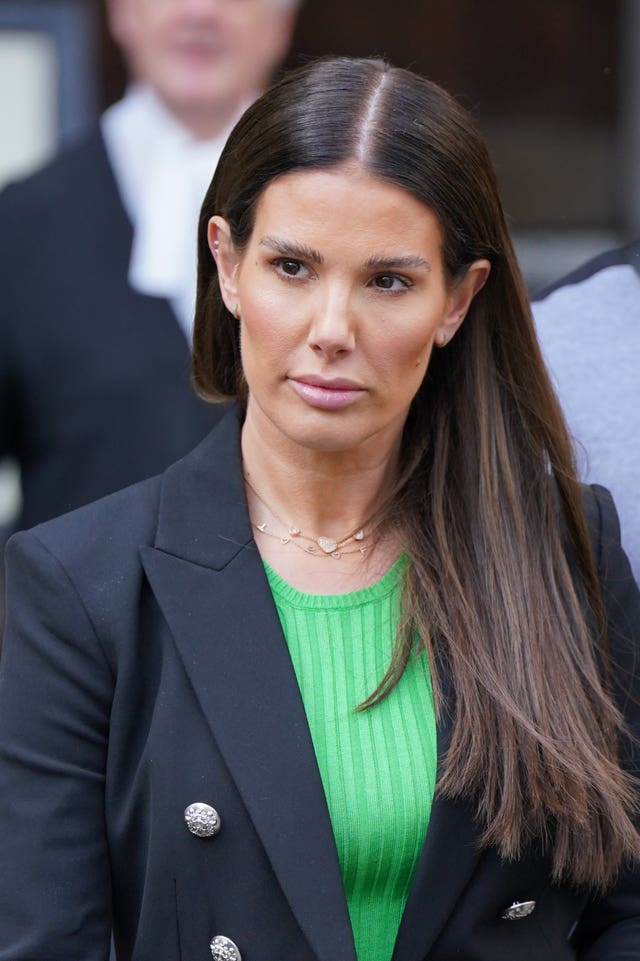Coleen Rooney has claimed she ran up a legal bill totalling more than £1.8 million from her high-profile Wagatha Christie libel battle with Rebekah Vardy, the High Court has been told.
Mrs Vardy, the wife of Leicester City striker Jamie Vardy, lost the legal action in July 2022 after she sued Mrs Rooney.
In 2019, Mrs Rooney, the wife of former Manchester United striker Wayne Rooney, accused Mrs Vardy of leaking her private information to the press on social media, which Mrs Justice Steyn found was “substantially true”.
In October 2022, the judge ordered Mrs Vardy to pay 90% of Mrs Rooney’s legal costs, with an initial £800,000 then ordered to be paid.
The women’s lawyers have now returned to court in London in a dispute over the amount to be paid, as lawyers for Mrs Vardy said that Mrs Rooney’s claimed legal bill totalled £1,833,906.89.
In written submissions for a hearing on Monday, Jamie Carpenter KC, representing Mrs Vardy, said that this included costs for a lawyer staying “at the Nobu Hotel, incurring substantial dinner and drinks charges as well as mini bar charges”.
He said: “The costs dispute has been rendered particularly intractable by the sheer magnitude of the costs claimed by Mrs Rooney, in absolute terms and when compared to her agreed costs budget, the number of errors in the bill and the extraordinary nature of some of the costs claimed.
“The bill, drawn at 100% of the costs claimed… totals £1,833,906.89.”
Mr Carpenter said the bill was “drawn without sufficient care” and had “a ‘kitchen sink’ approach”, and included “over £120,000 of costs to which Mrs Rooney has no entitlement”.
He also said that Mrs Rooney’s barrister, David Sherborne, “charged total fees over the course of the proceedings of £497,850”.

The court was told that Mrs Rooney’s total bill was “over three times Mrs Rooney’s agreed costs budget of £540,779.07” and it was claimed that she had “deliberately understated” her earlier costs.
This amounted to “serious misconduct, which involved knowingly misleading Mrs Vardy and the court”, and should lead to a reduction in the amount of money to be paid by Mrs Vardy as a result, Mr Carpenter said.
In court, he added that Mrs Rooney had been “deliberately misleading”, adding: “There is no other way to construe it.”
In the viral social media post in October 2019 at the heart of the libel claim, Mrs Rooney said she had carried out a months-long “sting operation” and accused Mrs Vardy of leaking information about her private life to the press.
Mrs Rooney publicly claimed Mrs Vardy’s account was the source behind three stories in The Sun newspaper featuring fake details she had posted on her private Instagram profile – featuring her travelling to Mexico for a “gender selection” procedure, her planning to return to TV and the basement flooding at her home.
Following the high-profile trial, Mrs Justice Steyn ruled in Mrs Rooney’s favour, finding it was “likely” that Mrs Vardy’s agent, Caroline Watt, had passed information to The Sun and that she “knew of and condoned this behaviour”.
The judge added that Mrs Vardy had “actively” engaged, “directing Ms Watt to the private Instagram account, sending her screenshots of Mrs Rooney’s posts, drawing attention to items of potential interest to the press and answering additional queries raised by the press via Ms Watt”.
Robin Dunne, representing Mrs Rooney on Monday, said in his written submissions that Mrs Vardy had shown “deplorable conduct” in the case, and that costs could have been lower if “she conducted this litigation appropriately”.
He said: “This was a libel claim which Mrs Vardy chose to launch, despite knowing that the Instagram post was true.
“Mrs Vardy refused to engage with Mrs Rooney to try and avoid these proceedings and by her conduct meant that significant additional costs were required to be incurred by Mrs Rooney.”
He continued: “It sits ill in Mrs Vardy’s mouth to now claim that Mrs Rooney’s costs, a great deal of which were caused directly by her conduct, are unreasonable.”
He said that Mrs Rooney’s budget was “not designed to be an accurate or binding representation” of her overall legal costs.
He added: “There has been no misconduct here. Had Mrs Vardy conducted this matter in a reasonable fashion, Mrs Rooney would be confined to her budget and would have recovered no more absent good reason.”
In court, Mr Dunne said that it was “illogical to say that we misled anyone”.
The hearing before senior costs judge Andrew Gordon-Saker, which was not attended by either Mrs Rooney or Mrs Vardy on Monday, will conclude on Wednesday.




Comments: Our rules
We want our comments to be a lively and valuable part of our community - a place where readers can debate and engage with the most important local issues. The ability to comment on our stories is a privilege, not a right, however, and that privilege may be withdrawn if it is abused or misused.
Please report any comments that break our rules.
Read the rules hereComments are closed on this article